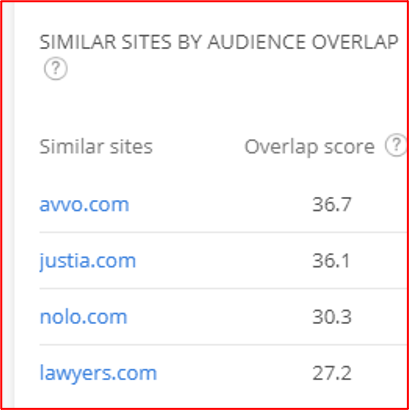One should submit a profile in a top legal directory to get more objective-specific clients as a lawyer.
According to a survey by Greentarget and consultancy Zeughauser, a lawyer directory listing is the sixth most important factor among clients.
This factor has been increasing higher than 67% since 2017.
Increased engagement with the internet has been essential in bringing about this trend.
Lawyer directory listing is more relevant than other factors like online portfolios and recommendations.
Google also created directories through the Google My Business platform.
Table of Contents
The importance of legal directory submission
It is no mystery that present-day professionals utilize one form of an online tool or another.
Classified directories represent a transition from self-promotion to an automated and robust system.
Being a tool for promotion, lawyer directories submissions ensure that any lawyer can get the right clients and referrals.
Lawyers need to be well aware of the implications of enlisting on a directory for their chosen specialties.
They need to differentiate between one type of lawyer directory and another.
Some directories like Avvo.com are free, while others like LawTally.com are not.
Some provide you the advantage of ranking higher on search engines, while others do not.
Here are some essential advantages.
Provides opportunities for collaboration.
Enlisting on a legal directory provides many opportunities for collaborating with experienced attorneys.
With increasingly diverging specialties, there is a need to access a pool of experts.
According to Berbay Marketing & PR, some directories create profiles for lawyers before they know about it.
Such lawyers can also claim their profiles and get good ratings.
When listed, site researchers and reviewers categorize them based on recommendations and reviews.
Similarly, this categorization makes it possible for blocs of lawyers to interact and share resources besides the many reports and analyses that those sites make available to them.
Higher visibility to clients.
This is by far the most crucial use of legal directory submission.
The study says 2/3 of consumers are more likely to hire lawyers with online reviews.
According to a 2016 study by FindLaw.com puts the figure at 98% in 2019 for all inquiries that hit the internet.
It is not new that legal directories rank impressively on Google and other search engines.
Besides, this practice is laden with lots of legal SEO practices.
Thus, it is imperative to identify the correct directory for your law firm.
This article will take care of this process.
Higher ranking of your website on search engines.
Besides making your firm more visible, high-ranking law directories can also make your website rank.
By creating a backlink to your website, you can benefit from their domain authority.
Neil Patel inputs that the number of backlinks and the domain score of any website are solid factors for ranking them.
Thus, you are on your way to page one with a backlink from a website with a great score.
This would inevitably increase your market share and turnover.
Gaining an impressive reputation.
Most lawyer directories allow clients the opportunity to leave reviews and make recommendations.
Responding to reviews and making improvements based on feedback builds reputation, according to TrustPilot.
If the website has a provision for reviewing services, there is every chance that website visitors can also see them.
Hence, there are chances that you can gain a beneficial reputation.
Improves case-specific searches.
In addition to local SEO rankings, search algorithms present lawyers and firms by their specialty and referral credit.
Lawyer directories provide a massive advantage in this regard.
According to Rock Pilots, the directory ensures that you have a “leg up” on local competitors.
Top lawyer directories
Using Alexa ranking metrics and Domain Authority, the following lawyer directories have the highest search and ranking potential. The list also includes fast-rising law directories.
| S/N | Directory | DA | Backlinks | Keywords |
| 1 | Justia | 89 | 5,428 | 274.3k |
| 2 | LegalZoom | 68 | 1,176 | 176.6k |
| 3 | FindLaw | 82 | 12,611 | 316.5k |
| 4 | Avvo | 68 | 3,411 | 236.1k |
| 5 | LawTally | 58 | 3,211 | 108.5k |
| 6 | NOLO | 61 | 3,462 | 247.8k |
| 7 | RocketLawyer | 65 | 447 | 97.7k |
| 8 | UpCounsel | 64 | 116 | 122.3k |
| 9 | Lawyers.com | 68 | 2,473 | 138.5k |
| 10 | AllLaw | 59 | 671 | 112.8k |
| 11 | Martindale-Hubbell | 64 | 3,649 | 80.5k |
| 12 | Super Lawyers | 60 | 2,531 | 93.1k |
| 13 | LegalMatch | 61 | 590 | 129.4k |
| 14 | LawInfo | 56 | 603 | 122.3k |
| 15 | Best Lawyers | 51 | 521 | 64.3k |
| 16 | Lawyer Legion | 37 | 104 | 44.8k |
| 17 | Lawyer.com | 54 | 375 | 62.8k |
| 18 | Legal Directories | 45 | 225 | 68.1k |
| 19 | HG.org | 64 | 1,211 | 142.3k |
| 20 | LawGuru | 53 | 700 | 14.5k |
NB: Analysis as of Tuesday, May 25, 2021
How online legal directories have modified legal services
Online lawyer directories or legal directories represent the widespread application of internet tools in various industries.
Legal directories have been in existence long before this time.
However, with the explosion of the internet, every profession and sector has been linked to it in a way or two.
We can identify the following advantages:
The broad spectrum of legal services.
Developers of legal directories organize them using such parameters as a specialty, location, and many others.
Overtly, this has made it very possible for enquirers to access a wide array of legal services.
This implies pulling out of the rat race for an attorney.
Yes, a general tag need not define you.
While some attorneys would be available for hire almost immediately, others would benefit from offering rare services.
Credit advantage.
Lawyers that have enlisted in legal directories have the advantage of getting reviews.
Credibility sites like Trustpilot provide users the opportunity to post reviews about websites.
Besides, most online directories like Amazon thrive on reviews.
This is also an essential feature of legal directories.
The law firms that enlist on legal directories also have their reviews and testimonies.
Together, these review features enable lawyers to earn credit as they work.
These advantages also make them more marketable-worthy.
Faster provision of services.
Like eCommerce, legal directories remove the distance barrier between lawyers and their prospective clients.
Within minutes, an individual seeking legal service can identify the right attorney for themselves.
This makes it very convenient and worth engaging with.
What you should do before enlisting on a legal directory
The process of identifying a profitable legal directory requires understanding the objectives of such sites as well as their ranking potential.
One also has to know the cost of enrolment.
Generally, the greater the benefits, the greater the cost.
A closer look at legal directories will reveal that each directory has its characteristics and opportunities.
Here, we shall examine their characteristics.
After that, we shall examine opportunities available with different lawyer directories.
Finally, we shall explain how you can take advantage of these opportunities when choosing.
Lawyer directories, like other directories, index links.
Howbeit, they are specifically for legal purposes.
Hence, most site visitors reach these sites intending to hire lawyers or get legal services.
Since there are many options, attorneys have the challenge of making decisions.
Since we want to help you identify the directory that suits you, we offer the following steps:
Define your purpose.
Most legal directories are in a rat race for higher rankings on Google.
After all, higher placement determines higher traffic.
Others are in for the money and some for the quality.
Hence, you need to know what you need before you consider enlisting.
The list above highlights directories by their Alexa ranking.
Alexa provides an up-to-date ranking of different websites based on variable metrics.
We listed some of these factors alongside.
Generally, higher-ranking websites generate higher traffic and have higher domain authority.
A high-ranking website enables you to get higher visibility.
However, if you search for a more practice-specific website for your law firm, you might need to look for various factors.
We shall provide some in this post.
Check your budget.
Enlisting on Justia is complimentary, while Avvo offers free and paid options.
Both websites have impressive listings.
However, Paid and free versions do not always return the same value for your law firm.
Hence, you must consider the returns on your payment.
Is it worth paying for?
Can you enlist without receiving premium packages only available to paid firms and attorneys?
The option is yours to make.
Identify the services offered.
LawGuru offers an opportunity for people to ask questions and get answers from lawyers.
LawTally is in the business of identifying lawyers by their location, practice, and reputation.
Justia features thousands of informative articles, among others.
This shows us lawyer directories are not just about creating links to law firms.
Some provide case studies.
Others provide diverse opportunities to grow.
Whatever the objective, it is vital that you glance through the services before signing up.
Be sure it would be beneficial to you.
Online legal directories and SEO
As stated earlier, online visibility is a vital benefit of legal directories.
Like it or not, more persons interact with the internet today.
Most of these persons search for the best possible attorney they can get.
Except they have specific attorneys they want to engage, enquirers often look for credibility.
Directories offer that opportunity for such enquirers to know the best lawyers by their specialties.
Often, they search by keywords or anything that allows them to relate to the search.
Remember that some persons are not as obsessed with the internet as you are.
Understand these persons and put yourself in their shoes.
What would you do if you needed a lawyer? You hit the internet.
The search bar pops up, and you are about to type in a bunch of words to locate the right attorney.
After you type, Google displays some links for you with thousands, or millions, of others.
You do not want to waste your time browsing through all that stuff.
You just need to locate an impressive lawyer with a record of accomplishment.
Maybe they are not very familiar with the metrics or algorithms.
Google, or any other search engine, is not into telling you all of that.
However, we are confident that SEO counts greatly in determining market share and patronage.
Mr. Adams is looking for an intellectual property attorney in the US.
He keys his search terms into the input bar and gets this:
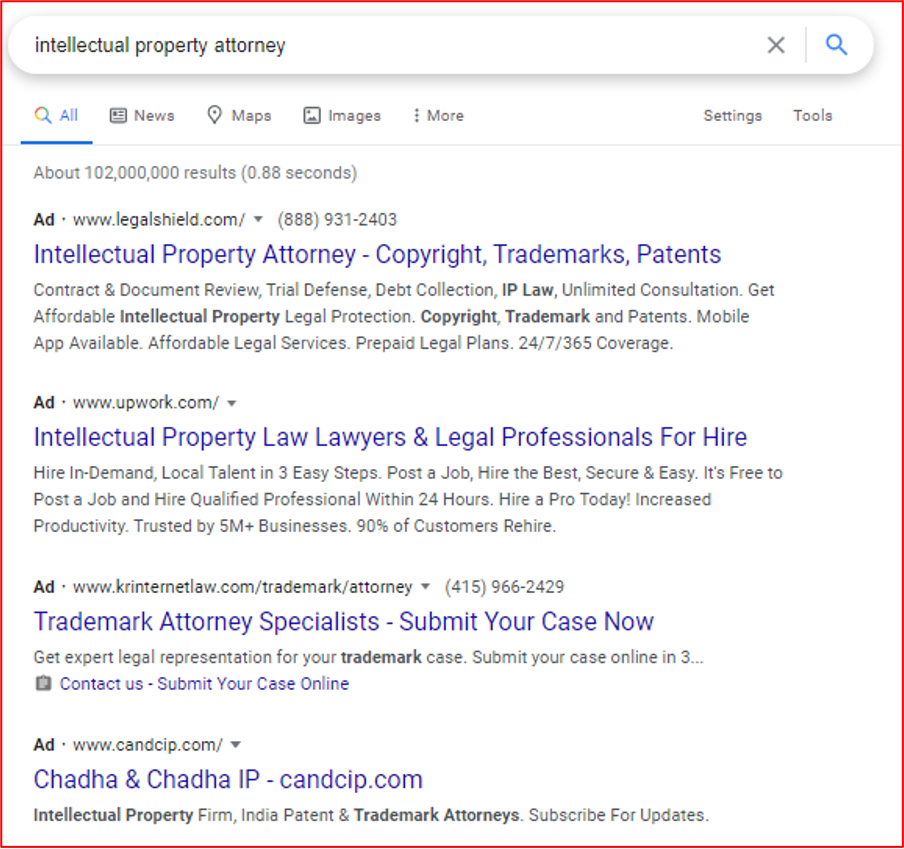
Google Ads For Law Firm
Underneath the ads, you find the following: You always get some sponsored listings showing at the top of your results.
This is normal.
Perhaps, this does not guarantee a hire.
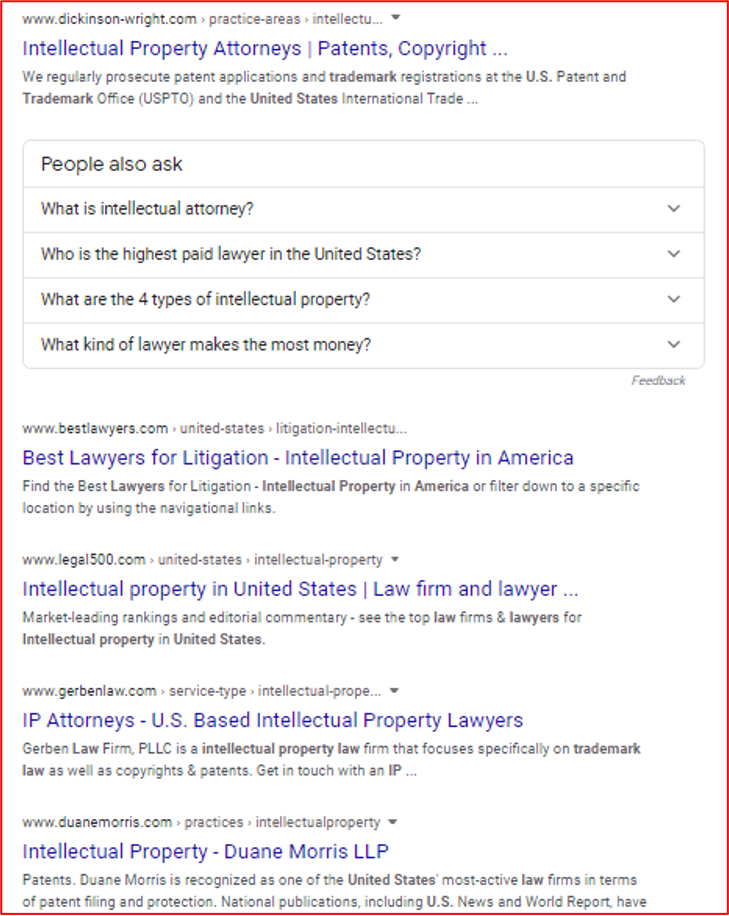
Organic Results
According to Inc., about 91% of web searchers do not really trust them. Hence, they should be little of a problem. That is except Mr. Adams turns out to be part of the other 9%.
You will realize that it has a mix of law firm websites and legal directories.
The specific law firms create these websites for their team of lawyers.
Ranking this high on search engines requires getting excellent offerings with your legal portfolio.
However, you can achieve this feat by enlisting in a legal directory.
Top 10 Free Lawyer Directory Listings
It is essential to consider your pocket and consistency of income when enlisting in a lawyer directory.
Do this with an understanding of the possible impact on your future endeavors.
For clarification, most lawyer directories are scraper sites.
According to enterprise reviewer and analyst Sean Doherty, you do not require authorization to create an account for yourself.
This can be a hurdle in itself or may not be at all.
However, the work that remains on such cases is to go ahead and claim your profile.
The profile-claiming process can be accessible for some and not for others.
Due to the operating system of such websites, Sean Doherty inputs that the sites create the legal services as packages and tag the lawyers that provide the services.
Clients identify the particular service they want and select the lawyer who provides them.
The lawyer receives payment when the client pays to the site after the service.
The site later pays the lawyer at given times or automatically.
In most instances, the lawyers can withdraw from the site anytime.
These practices have helped many free legal directories stay in business throughout the internet’s history.
How to identify the top free legal directories
If you consider enlisting with a free legal directory, Trial Law proposes the following:
- Consider the possible benefits you will get from the listing. This can be in the form of its available patronage, specialties, and security.
- Consider the prices. Be sure you can afford their rates. Check to know if there are any hidden charges or fees. Identify any recurring payments.
- Consider the age of the website. There are so many directory websites these days that you might be confused about which one to choose. This is an indicator of trust on the website, according to Infidigit.
- This way also impacts the trust clients have in you as a service provider on the website. Remember, nothing good comes easy. Clients will be suspicious at the very thought of knowing that a website enlists lawyers for free.
- Know your traffic. If you want to enlist on a site that allows you to meet clients that manage properties, you would be in the wrong place enlisting on a site with divorce cases as the bulk of its clients’ projects. Where does the majority of their traffic come from? We will show you an elementary step to find this out down the page.
- How will you assess your results? Remember that the main aim of enlisting on a legal directory is to gain adequate visibility. Doing otherwise will defeat your purpose. Hence, ensure that the site has the means to evaluate your progress.
Free directories
| S/N | Legal directory | Domain Authority | Linking root domains | Ranking keywords |
| 1 | Justia | 89 | 91.1k | 1.4m |
| 2 | Avvo | 68 | 46.7k | 705.2k |
| 3 | HG | 64 | 18.1k | 257.9k |
| 4 | Best Lawyers | 51 | 8.9k | 49.8k |
| 5 | US Legal | 67 | 16.9k | 90.9k |
| 6 | Lawyer Legion | 37 | 2.5k | 40.8k |
| 7 | Law Guru | 53 | 5.9k | 1k |
| 8 | Law Link | 48 | 4.4k | 10.8k |
| 9 | Just Great lawyers | 35 | 2.9k | 9.2k |
| 10 | Public legal | 52 | 4.8k | 28.6k |
We collected the data above through the Moz domain analysis tool on June 12, 2021.
The legal directories listed above show properties of legal directories that you should look out for before you embark on the sign-up process. We explain these items and their advantages in detail below.
The Domain Authority
Moz developed the Domain Authority score to assess a website’s ranking strength quickly.
It employs a couple of factors to arrive at this score.
The most viable of these factors are the linking root domains and keywords.
Domain Authority has a scale of 1 to 100, with 100 showing a higher ranking potential.
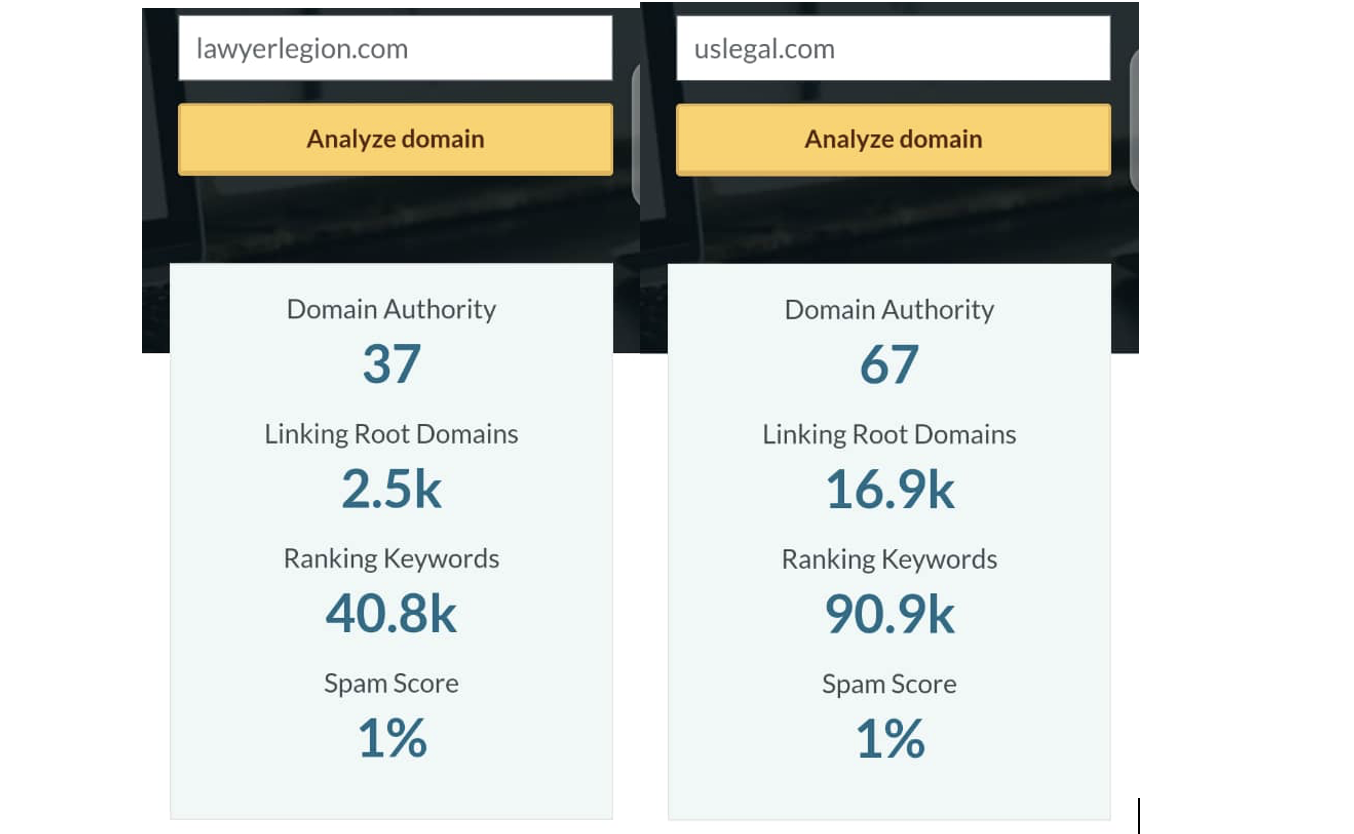
Side by side domain analysis
Lawyer Legion and US Legal side by side, and US Legal have about 16,900 linking root domains while Lawyer Legion has about 2,500.
This implies that US Legal has more other pages linking to it across the internet.
We can assess the authority of a website through the amount of traffic it gets from other sites and search engines. Consider the following:
Linking root domains
When you want to tell if you are correct on a particular arithmetic exercise, you want to check the answer of the top student in the class.
This cements the place of the top student in arithmetic.
Similarly, you can tell that more websites consider US Legal as an excellent reference for their topics.
Pacelab identifies linking root domains as a vital factor for Google algorithms and guides clients with specific search terms.
Ranking keywords
Moz identifies ranking keywords as those keywords for which a website ranks well.
Considering that you are an insurance attorney, your natural inclination would be to register on a directory that easily ranks well for insurance keywords.
The Moz analysis tool provides the main ranking keywords for websites.
Hence, it is ideal to consider these before signing up with a free legal directory.
Top 10 Paid Lawyer Directory Listings
Compared to free directory listings, a paid lawyer directory is somewhat straightforward in charges and subscription fees for enlisted lawyers.
| S/N | Legal directory | Domain Authority | Linking root domains | Ranking keywords |
| 1 | Lawyer.com | 55 | 6.4k | 120.8k |
| 2 | Super Lawyers | 60 | 21.4k | 244k |
| 3 | Law Info | 56 | 8k | 110.6k |
| 4 | Lawyers.com | 68 | 34.2k | 278.4k |
| 5 | NOLO | 71 | 50.5k | 682.5k |
| 6 | FindLaw | 82 | 127.5k | 1.1m |
| 7 | LawTally | 59 | 1.2k | 3.6k |
| 8 | Mediate.com | 60 | 9k | 19.8k |
| 9 | Enjuris | 42 | 1.6k | 38.1k |
| 10 | Jurist | 64 | 11k | 14.5k |
NB: Information correct as of June 13, 2021.
Why a paid directory?
In addition to the many benefits of free directories, paid directories provide many other advantages that make them stand out from the free ones.
However, the extent to which they are beneficial is a crucial factor to consider before you claim your profile or register afresh.
Tara Bailey highlighted some factors that make paid directories somewhat unique. We explain them below:
Control
Both free and paid directories require some form of financing to keep running.
Hence, a traditional means of income is required.
According to Frank Olivo of Sagapixel, a legal website can cost up to $80,000 to design.
Besides other running costs that run into thousands of dollars every month, this is true.
Due to this setup, legal directories must have some sort of regular income – whether they be paid or free.
With free directories, adverts and other promotional activities can benefit from sponsoring these.
Due to this, listed lawyers do not have complete control of their accounts.
As a result, some directories provide free and paid listings to enable the lawyers to control their accounts when they upgrade to the paid packages.
Avvo does this.
However, you easily avoid this fundamental problem for completely paid directories as you have complete control of your account from the very start.
SEO
Legal directories provide more than accessibility.
They hire the services of SEO experts that boost the visibility of the directory online.
Tara Bailey observed that these directories appear above individual legal firm websites on the search engine results page (SERP).
Whether you have a personal website or corporate website, a paid legal directory ensures that you are right where your clients will find you – at the top of search results.
Free directories require lawyers to make an extra payment to access these perks.
Further research shows that your profile benefits relatively from the many backlinks that contribute to the website’s authority.
Higher ROI
According to Relevance, one of the ways to get higher returns on investment is to increase everything.
One of these is the financial commitment you make.
As a matter of duty, the managers of paid legal directories give their best to create better visibility for their clients.
In some instances, you need to pay more to get more services.
In general, these provisions create more opportunities for conversion.
Identifying a suitable paid legal directory
To get the advantages of a paid legal directory, you need to closely analyze them for their features.
A popular and reliable way to get this information is to carry out a quick analysis on Moz.
Nolo is a high-ranking paid legal directory.
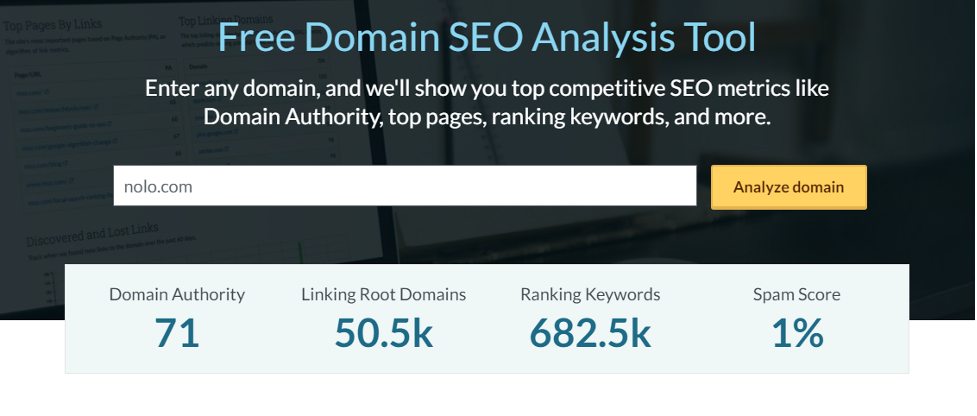
Nolo.com Domain Analysis
DA of 71 shows that it has a chance of ranking better than many other websites.
DA shows that would outrank Mediate.com and Super Lawyers.
Similarly, LawTally would help us understand a relationship here.
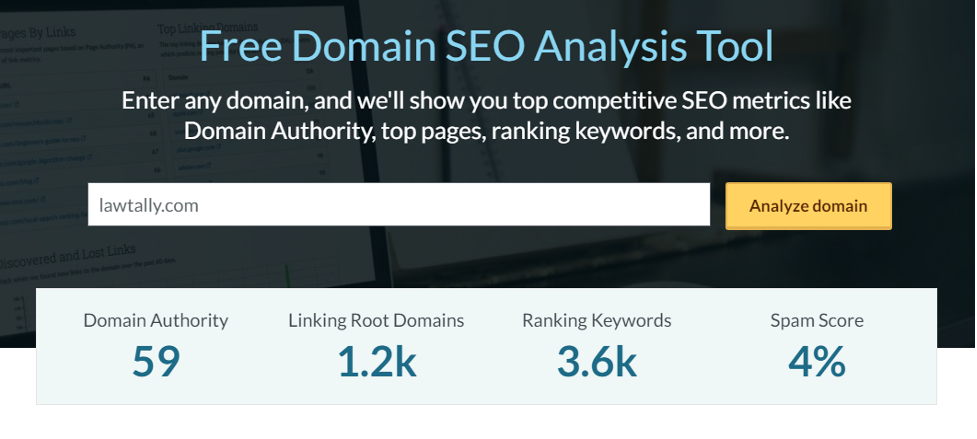
Free Domain Analysis LawTally
LawTally has a lower number of linking root domains and ranking keywords compared to Enjuris. However, it has a more favorable domain authority.
This is the strength of the linking domains and other advanced metrics like competitor sites on main keywords.
Given this relationship, you can look closer for other factors like what we show below.
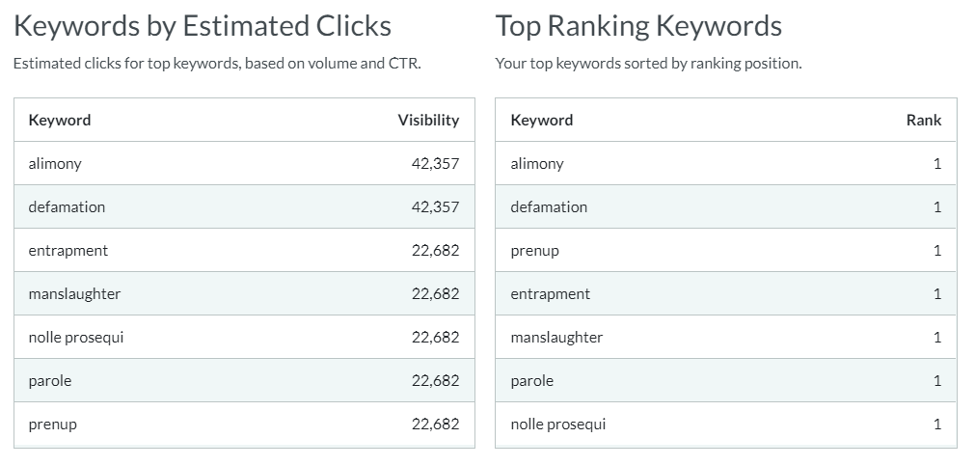
Nolo KW Volume
The tables above show the visibility of Nolo for the given keywords.
Hence, you would rank better for defamation according to this information provided.
Consider the information for Super Lawyers below:
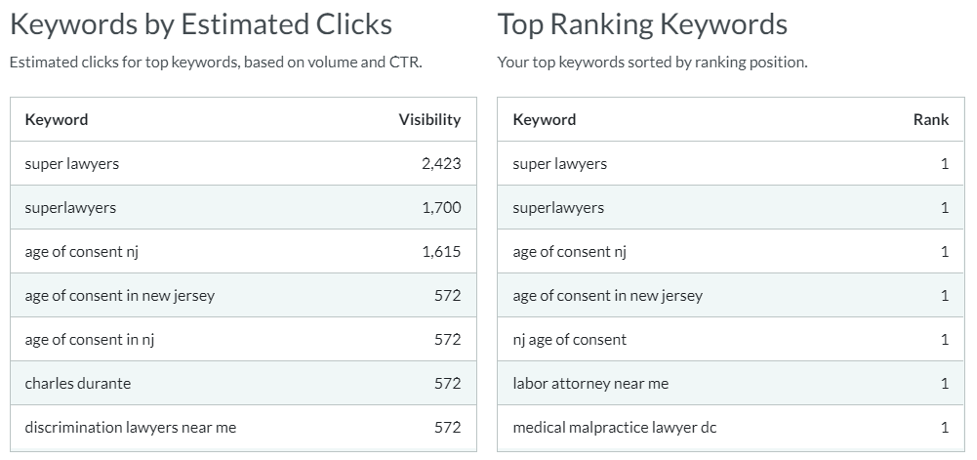
Keyword Analysis Super Lawyer
It shows a current trend for the “age of consent.” A paid analysis with the assistance of an experienced SEO expert would provide more information on the most-ranking keywords.
If you want to have a higher ROI, identifying the directory that ranks better for keywords that concern you is the appropriate step to take.
How to know the correct legal directory for you
The best legal directories put much effort into quality.
You can identify quality in various ways.
However, making legal directories makes some directories different from others.
Considering the list compiled above, the following criteria are noteworthy.
Alexa Ranking
Alexa ranking measures websites based on the average number of page visits they receive over the last three months.
Though independent of search analysis, Alexa is an authority for grading the power of any website.
To enlist in an active website, it is ideal to consider a high-ranking legal directory.
The higher the Alexa ranking, the greater the traffic that it gets.
This will also give you a higher chance of engagement and business.
To know a site’s Alexa ranking, simply visit here and analyze the prospective legal directory address.

Alexa Ranking
Alexa will return a set of metrics, including the site’s ranking. It also shows you how the site has fared in the last three months and the countries with the highest search.
For example, an analysis of Justia will return the following score.
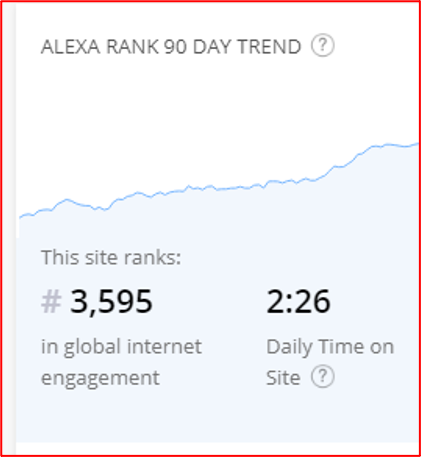
Alexa 90 Days Trend For Justia
Justia ranks 3,595 on global internet engagement at the search time.
It also shows the 90-day trend of the website.
As may be seen, the website has been increasing over the 90-days report period.
See the 90-day trend report in the image below.
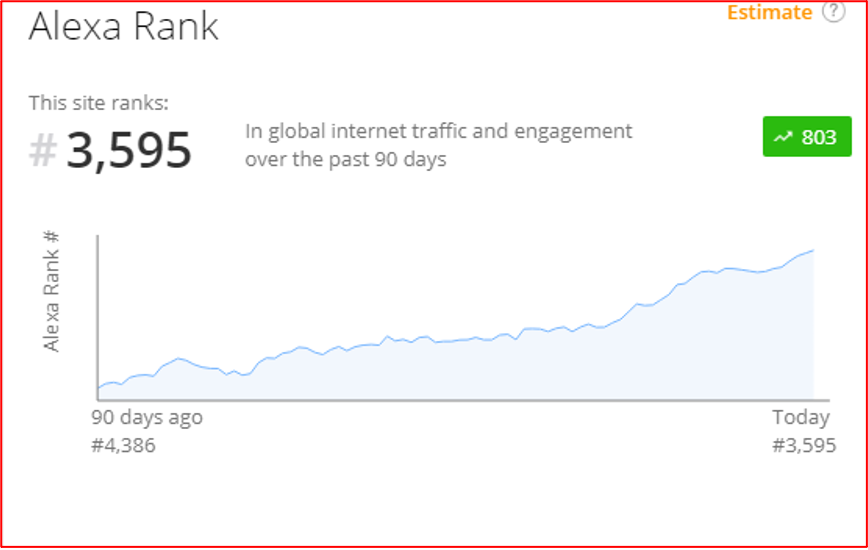
Alexa 90 Days Reports For Justia
This report puts the figure at 803.
The trend shows that the site has moved impressively in the last three months.
Thus, enlisting in Justia would be a good idea.
Alexa country ranking
Alexa also shows how a site ranks in different countries.
This ranking might be beneficial for identifying your chances of success in your target market.
While an international lawyer might be very concerned about the global rankings, regional lawyers also look out for specific country rankings. See below:
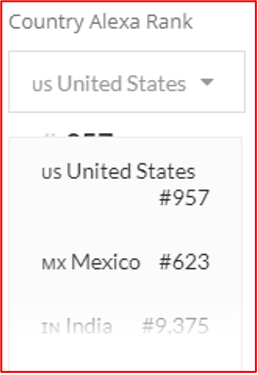
Country Ranking
According to this report, the site ranks 957 in the US and 623 in Mexico.
This ranking is impressive for a law directory.
Lawyers that want to get clients from these countries can quickly enlist here.
Competitor metrics
Knowing competitor sites’ ranking helps you better understand alternatives or assess your possible advantage.
Alexa shows how different legal directories compare or overlap in the audience.
Consider the analysis on FindLaw below:
This report shows that Avvo, Justia, and Nolo share much in common with FindLaw.
Thus, one can easily choose between these alternatives and get a decent clientele.
Except for the cost of signing up, these sites would share very similar traits.
Alexa also highlights how the site you are analyzing fares in its audience share.
FindLaw gets about 78.9% of the audience searching for information common to FindLaw, Avvo, Justia, Nolo, and LawTally.
These persons might be lawyers using the site.
However, the main targets are clients looking for an attorney online.
The comparative average shows the average visits to similar sites.
Thus, we can see here that FindLaw has an impressive following for people searching for legal directories.
Legal directories by keywords
Another way to select a legal directory is by traffic-related to relevant keywords.
As stated earlier, most enquirers use keywords when conducting queries.
Alexa shows the percentage of keywords that drive traffic to a particular website.
This would show if enlisting on the directory would drive more traffic your way under that keyword.
See for example:
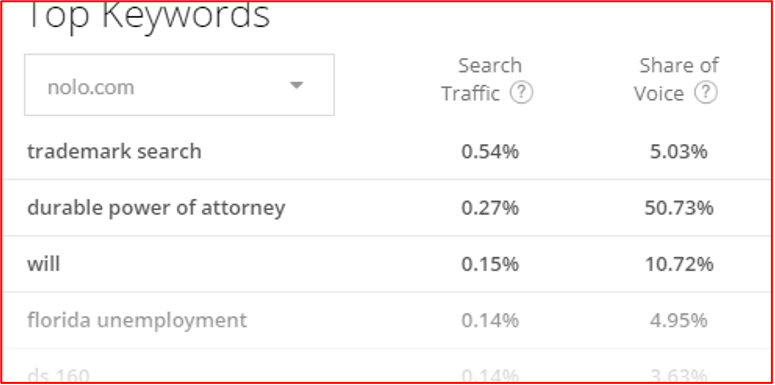
Top Keywords
More than 50% of persons searching for “durable power of attorney” would click on Nolo.
This is not the same with “trademark search” or “Florida unemployment.”
Website authority
Website authority is a significant standard to consider before selecting a legal directory.
Ahrefs has a tool for measuring this factor.

Website Authority checker Ahref
You can run the analysis for your chosen legal directory by typing the address into the bar.
If the address is active, it returns the website’s domain rating on a scale of 100.
These metrics, though independent, have substantial implications for the ranking potential of the said website.
We ran an analysis on Avvo.com and got the following report:

Domain Ratings for Avvo
A domain rating of 90% is impressive.
This means that enlisting on this site will increase your chances of ranking higher on search engines.
It can also pull this traffic to your website and other associated pages.
How do we know that this score is suitable?
The rating is excellent in the first place.
If that were a standard to go by, we would comfortably say that Avvo stands somewhere in the top 10% of websites.
That would mean the top 10% of legal directories.
Furthermore, we can infer from this metric that enlisting would draw you close to the top of page one of any search engine.
Dofollow links
As may be seen from the report above, dofollow links play an immense role in the position of a legal directory.
Avvo has about 7 million links to it.
About 66% of these are dofollow links.
These links determine the amount of organic traffic that can reach this site.
Hence, it has a high ranking.
Similarly, the report shows that about 47,000 different websites link to this website.
That is a massive pull of legal business for lawyers signed up.
However, this could come at a cost.
Dofollow links are links on web pages that search engines can follow to reach a destination page.
In this case, Avvo has a bunch of such links.
It shows that it can have lots of engagement.
Suppose you sign up for a legal directory with many dofollow links.
The site will naturally draw web traffic to you.
This will also result in higher client engagement and more hires.
That is what a good domain rating (DR) can do for you.
Look out for this attribute before enlisting.
Categorization
Let us say you specialize in a particular legal practice domain and get specific traffic on that count.
You would have to find a legal directory that speaks your language.
Many legal directories have this attribute.
Look at LawTally, for example.
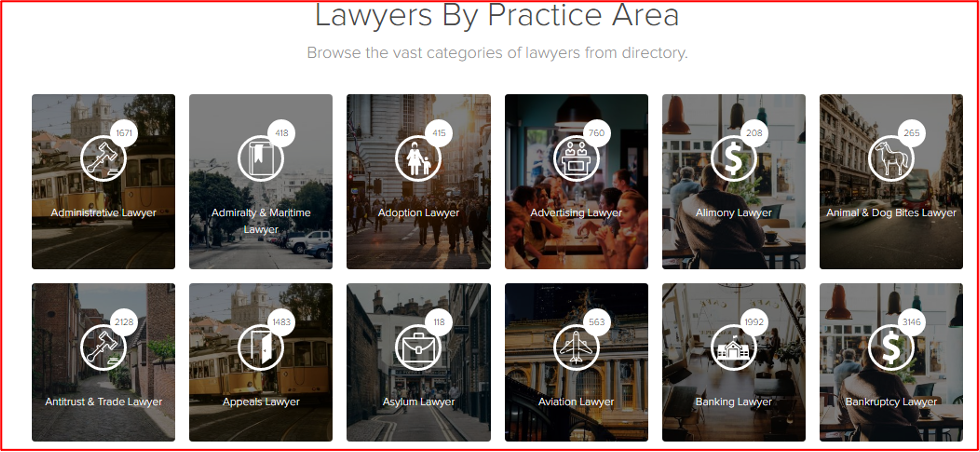
LawTally by Practice Area
It features diverse categories of lawyers.
Each category has tens, hundreds, or even thousands of lawyers.
Signing up for this directory would mean easy navigation around the site and quick identification of an ideal attorney.
Most other sites offer this kind of categorization—Howbeit, in different formats.
Ensure you know about these arrangements before you sign up.
We see that categorized sites also provide many other benefits on a closer look.
In the administrative lawyer section of LawTally, you can find this:

Lawyer Listings
This shows us how much some sites put into creating relevant portfolios for their clients.
On a similar site like SuperLawyers, enquirers can easily key in the kind of lawyer they want.
They can type in the name or the legal issue type.
They can also type in the preferred location of the lawyer.
Furthermore, SuperLawyers also allows the accessible location of law firms by its search feature.
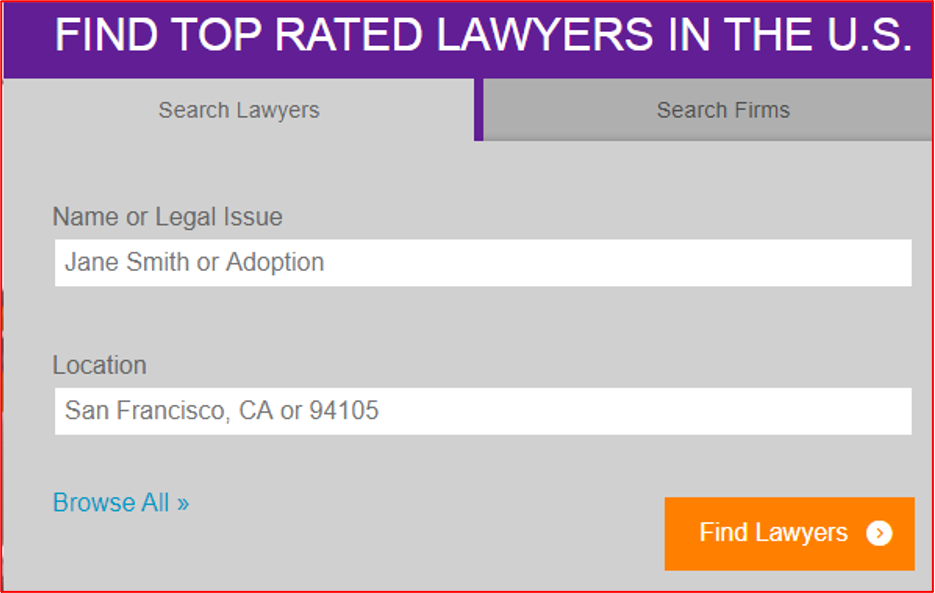
Law Firm Search
Legal directories like this are easily navigable. At the snap of a finger, you can be located.
Thus, it is best to try checking out such sites.
Local search feature
A legal directory without a local search feature would be difficult to identify a prospective lawyer.
Except, of course, it is not necessary.
Most of the legal directories identified in our list make this feature available for lawyers and clients.
Primarily, this makes it very convenient to conduct well-directed searches.
The convenience serves both lawyers, clients, and researchers.
In most cases, legal directories have a location field where users can type in the primary location of the lawyer.
For directories serving international purposes, this feature is more elaborate.
It also allows users to work within specific provisions.
This recognizes that various regions and states are run by different laws most of the time.
Similarly, some industries have different versions of the law in other areas.
The location feature quickly makes the identification of an ideal lawyer straightforward.
A well-diversified legal directory ensures that all search queries can receive directions to their answers.
Blog posts
The top legal directories are hosts of relevant legal content besides lawyer information.
This is a vital factor in identifying a profitable lawyer directory.
The best legal directories often feature hundreds and, sometimes, thousands of legal articles.
Such articles would range from the outcomes of legal processes to other vital information for the law domain.
Take Justia’s marketing blog, for example.
It features lots of helpful information for both lawyers and clients.
It also has testimonies from clients and professional information for lawyers who want to diversify or try some intricate subjects.
This legal marketing and technology blog has been running since 2005.
They update these blogs several times every month.
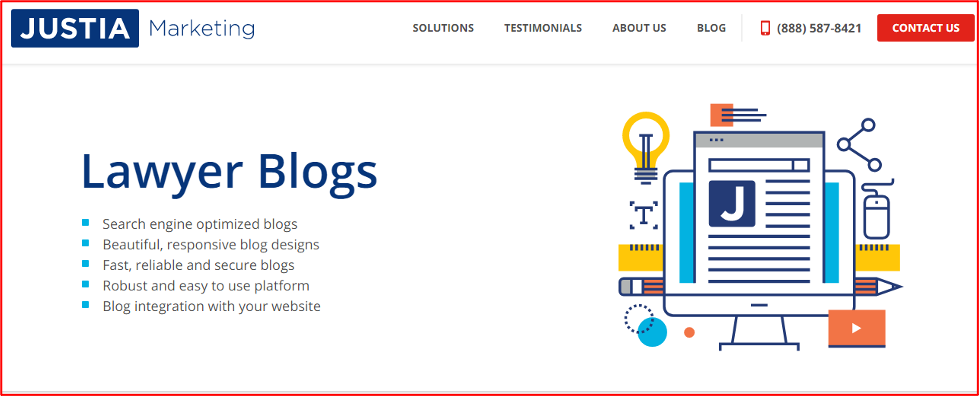
Justia Marketing
The amount of information that traverses a legal directory shows, primarily, how helpful it is to its visitors.
Hence, looking out for this feature is necessary.
Similarly, contributing blog posts to a legal directory helps an attorney follow.
It aids visibility and trust.
In most cases, blog posts show how knowledgeable or experienced an attorney is in certain legal matters.
They also allow users to engage with these lawyers by asking questions and sharing experiences.
Alexa shows how these blogs make different legal articles rank side-by-side on vital keywords.
See the image below for an example.
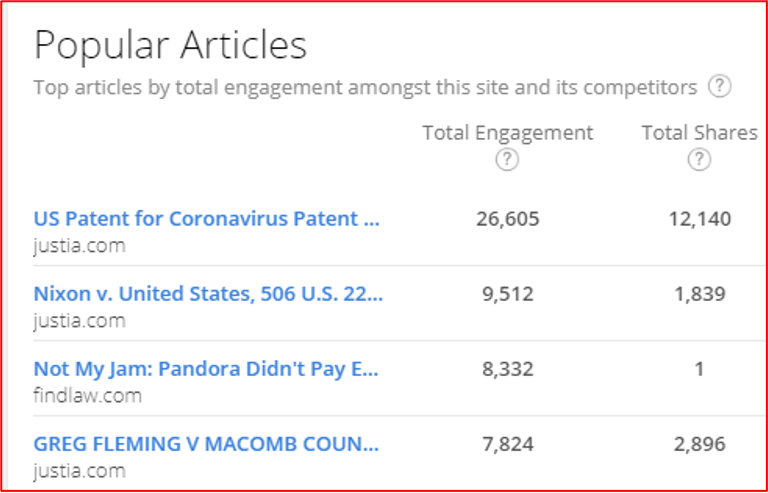
Popular Articles
It shows popular articles for FindLaw.
However, as the description shows, it does not only show the result for FindLaw.
It also shows other websites that share the same audience.
Here we see a couple of articles with Justia.
This implies that Justia has a more significant engagement for the types of articles that would drive people to FindLaw (put straight).
Put differently, the amount of engagement that a legal directory enjoys is a function of the Relevance of its content.
Quality content drives many people to sites.
Not many people want to dive straight into business.
A couple of persons would like to check a few spots and determine if the lawyers are worth working with after all.
Client services
Some persons remain on-site more than others do.
LawGuru knows this, and that is why it offers an interactive platform.
A couple of other legal directories do the same.
However, the practice at LawGuru is remarkable.
Check out their page below.
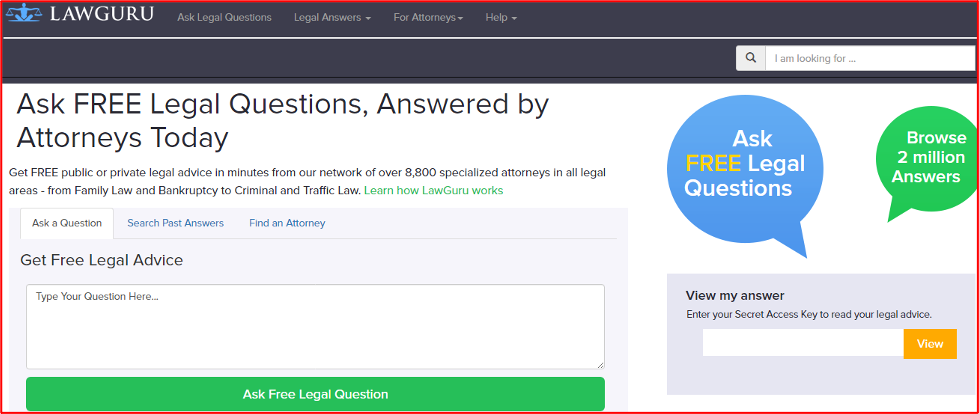
LawGuru
They know that “Customer is king” and work accordingly.
Consider the setup.
LawGuru dedicates about 80% of its homepage to addressing customer inquiries.
A practice like this can make many clients appreciate their interests and act accordingly.
There are also ready-made questions and answers.
It creates an environment that is similar to a legal forum.
We know that legal questions are endless.
However, providing clients the opportunity to understand the legal environment makes hiring easier.
It is like having access to an encyclopedia of law.
Caliber of services
The kinds of services that a lawyer directory lists will determine its lawyers’ patronage.
This is besides the different industries and specialties.
Justia offers pro bono services besides many other legal services.
This might be an excellent deal for lawyers with a passion for the poor or helpless.
If you are a humanitarian lawyer, you might have to look up a directory with a cause other than allowing clients to hire attorneys for themselves.
AllLaw provides robust settlement and payment calculators that allow users to arrive at due figures quickly.
It also provides a consultation channel, as do many other legal directories.
AllLaw also offers other resources besides its hypothetic legal calculator.
It has some legal books, forms, and software on-site.
These are just a few of the many kinds of services legal directories offer to clients.
Since lawyers provide these services in practice, you must look for them and determine if they suit your goals and specialty.
Visitor engagement
We take you to Alexa again to see some crucial metrics – visitor engagement.
Like it or not, directories are created for visitors.
These visitors may be attorneys or clients.
Whichever way, we know that a bulk of those persons are clients.
If this is true, then we can be sure of business.
Otherwise, the site is only making unnecessary noise.
In this regard, Alexa provides some key metrics.
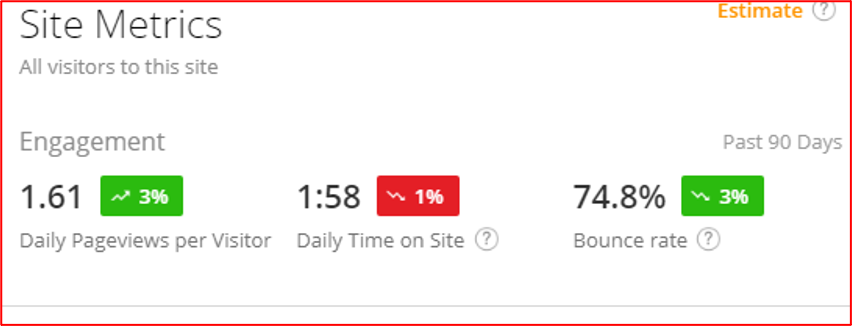
Site Metrix
The report above is for FindLaw.
As may be seen, site visitors engage mildly with the site.
On average, individual visitors view the site 1.61 times.
This would imply that more persons who reach the site view more than one page on average.
This would mean that related to its Alexa ranking, and users probably have specific pages they visit before leaving the site.
It also reports that the average time spent on the site is somewhere around 2 minutes.
This shows a fall from the previous reporting period (of 90 days).
Furthermore, the report shows that 74.8% of the site visits are to just one page.
It means that a more significant number of persons check out only one of the site’s pages.
As we can see, this is a fall from the previous 90-day report.
The fall implies that more persons now check out other pages besides the initial page visited.
These website metrics indicate the trend of the interaction of visitors with the site.
Before enlisting on any legal directory, be sure to study the trend of visits and engagement with the site over a given period.
Alexa has provided reports for the past 90 days.
This is adequate.
Alexa also shows traffic-generating channels.
Free analyses return search traffic, while paid analyses also return referral, social, and direct traffic.
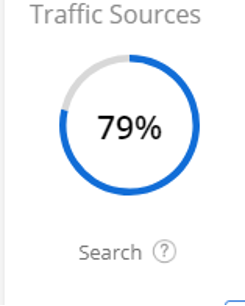
Traffic Score
The report shows that about 79% of the traffic to this site comes from search results.
The analysis reveals that these include organic and paid searches.
The report also revealed that much of the traffic followed Google and other search engines.
This would inform us that most site visitors reached the site through a search engine other than a social media click or referral.
Trust score
Trustpilot is an online resource for identifying a credible legal directory.
Before you enlist on a legal directory, you should run an analysis on it at Trustpilot.
The parameters to look out for include the number of reviews sent and the average rating.
We ran an analysis on LegalZoom; a Consumer-centric legal platform, and Trustpilot returned the following report:

Legal Zoom TrustPilot Rating
As we can see, it has a report of 2.0 on average from 156 reviews.
Trustpilot also allows site owners to claim their sites and respond to negative reviews.
Similarly, Trustpilot also provides contact information and other details about the website reviewed.

Negative Reviews
Trustpilot is independent of rankings and other metrics.
However, it can help to tell a thing or two about any website.
Be sure to read the reviews and responses before you conclude. Good luck with that.
Frequently asked questions
This post has shed light on the main areas to consider before enlisting in a legal directory.
Howbeit, here are some questions some attorneys frequently ask before enlisting.
We also provide some well-researched answers to them.
Is it compulsory to enlist in an online legal directory?
No, it is not. Enlisting in an online legal directory is a choice you have to make.
Make an informed decision before making conclusions.
We provided a list of essential considerations to make before making a decision.
If, after your considerations, it does not turn out to be necessary, you might not bother doing so.
However, enlisting on a legal directory is necessary if you need more visits to your page and increased patronage.
Is it expensive to enlist on a legal directory?
Yes and No. the bulk of legal directories are free to use.
Some have a mixture of free and paid sign-ups.
A few are paid directories.
However, the cost is never a challenge anywhere in signing up for a legal directory.
Among the top free legal directories are Justia and Best Lawyers.
HG.org charges around $195/year while Nolo pegs its fee at $1125/year, while LawTally costs merely a cup of coffee.
Paid legal directories provide some unique resources to their lawyers and firms.
Besides, directories that have both versions – like Avvo set some limits for free sign-ups.
Hence, it might be best to consider the kind of services you wish to get as a member.
Also, know if your package would allow you to make the most of your services as a lawyer.
Is it necessary to enlist in a high-ranking legal directory?
Yes and No.
One can not ignore the importance of increased visibility on the internet nowadays.
This post dedicated about 65% of its content to helping you enlist on a high-ranking legal directory.
This approach is intentional.
According to WebFX, only about 25% of users scroll past page one.
This figure gets lower and lower for subsequent pages.
Besides, not many persons look past those sites ranking higher on page one.
Organic search drives more than 50% of traffic to any site.
Page ranking plays a significant role in making legal practice a success.
On the other hand, if you do not find it a requirement, you might just miss the visibility.
How do directories help my website ranking?
Enlisting in a legal directory directly improves your legal portfolio.
It directly makes your website rank higher by passing a link juice and web page authority.
As you may have known by now, different websites benefit from each other through backlinks and referrals.
With a typical legal directory, there are tons of backlinks and referrals.
These backlinks pass some value to the websites that they enlist.
This value from high-ranking sites is “link juice” in colloquial terms.
With authoritative backlinks, websites get higher appeal to Google and other search engines.
This implies that if your website or social media profile is on a high-ranking legal directory, the site passes some of its value to your page.
You are practically rubbing shoulders with the “big boys.”
These benefits often come at no cost for most of these websites.
My profile is on a directory without my knowledge. Is this normal?
Yes, this is normal. It is common practice for legal directories to enlist lawyers without their knowledge.
This practice is not limited to legal directories.
It allows the directory admin to grow their reach and helps lawyers be visible online.
To claim your profile, simply follow the links to claim your profile.
You can ignore it too.
On a closing note
Remember to look out for marketing opportunities for your profile.
These efforts offer you some degree of exposure and ensure that you are reachable to the people that matter to you.

